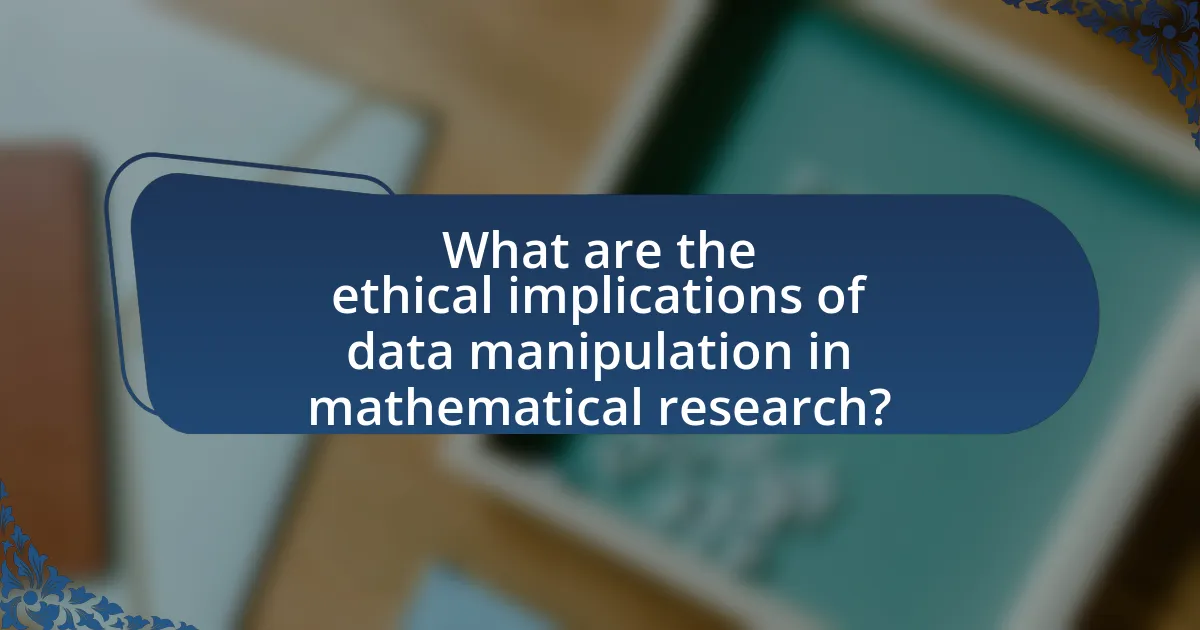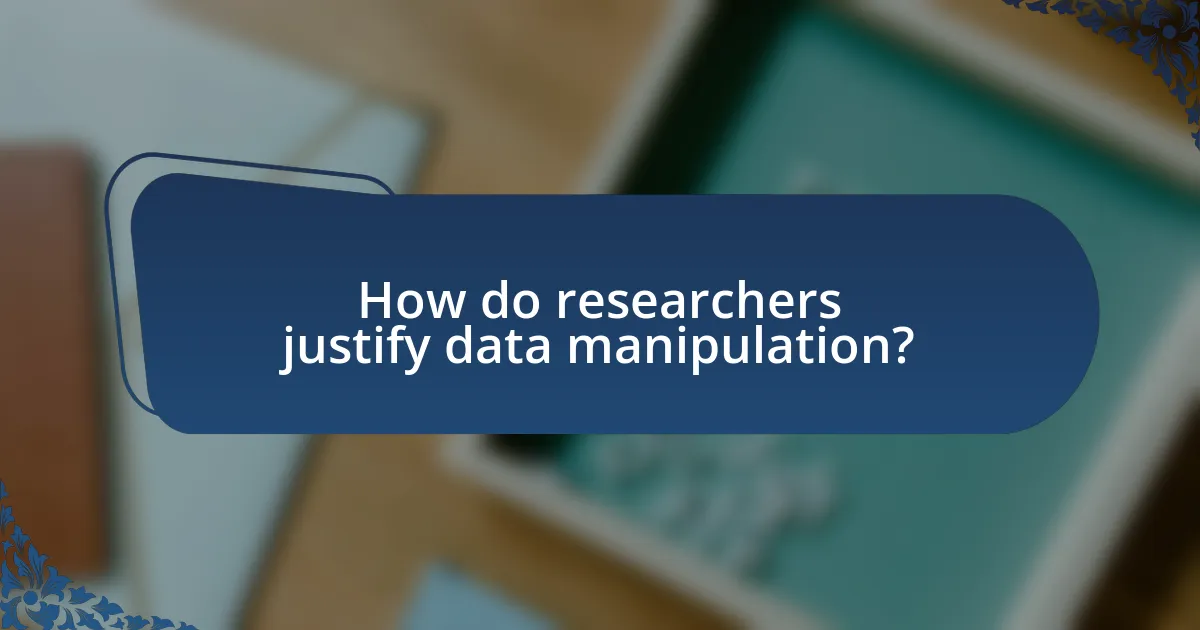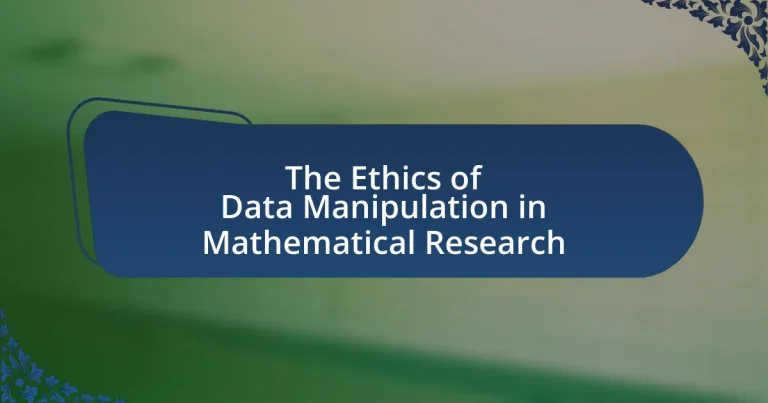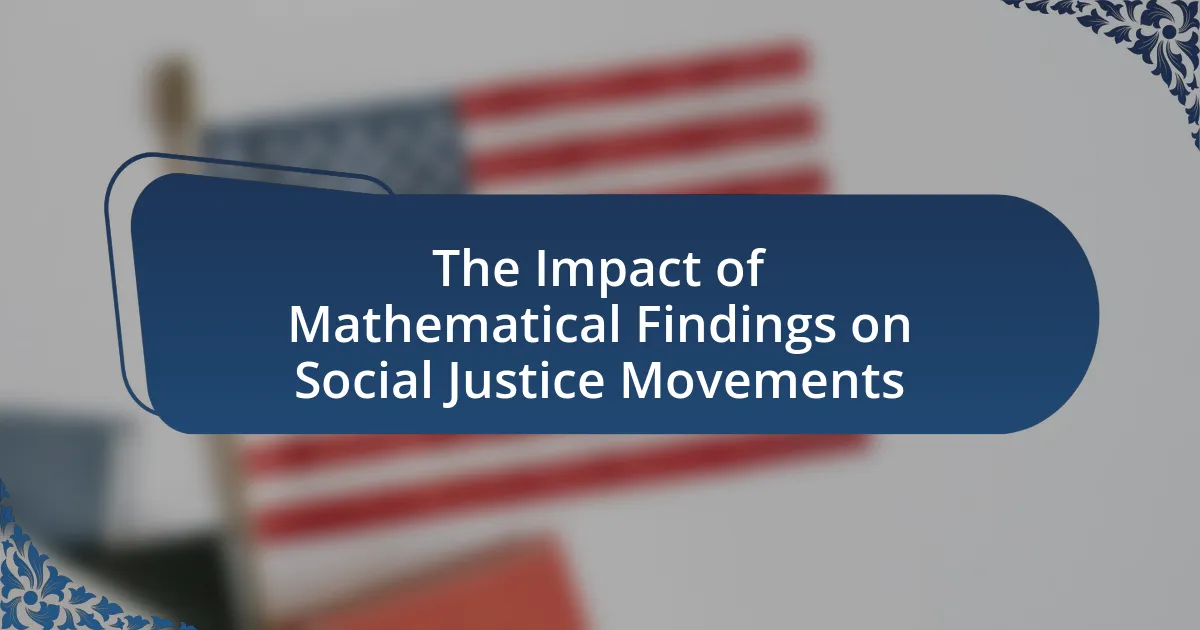The article examines the ethical implications of data manipulation in mathematical research, emphasizing the importance of data integrity for maintaining the credibility and reliability of scientific findings. It discusses various forms of data manipulation, including fabrication, falsification, and selective reporting, and highlights the severe consequences of compromised data integrity, such as misguided policies and loss of trust in the scientific community. Additionally, the article explores the justifications researchers may use for unethical practices, the pressures influencing their decisions, and the measures that can be implemented to promote ethical research practices and prevent data manipulation.

What are the ethical implications of data manipulation in mathematical research?
Data manipulation in mathematical research raises significant ethical implications, primarily concerning the integrity and reliability of scientific findings. When researchers alter data to achieve desired outcomes, they compromise the foundational principles of honesty and transparency that underpin academic inquiry. This manipulation can lead to false conclusions, misinforming subsequent research and potentially causing harm, especially in fields like medicine or public policy where decisions are based on mathematical models. Historical cases, such as the retracted studies in medical research due to data fabrication, illustrate the severe consequences of such unethical practices, including loss of credibility and trust in the scientific community.
Why is data integrity important in mathematical research?
Data integrity is crucial in mathematical research because it ensures the accuracy and reliability of results. When researchers maintain data integrity, they uphold the validity of their findings, which is essential for building trust within the scientific community. For instance, a study published in the journal “Nature” highlighted that data manipulation can lead to erroneous conclusions, undermining the entire research process. Therefore, preserving data integrity not only supports the credibility of individual studies but also contributes to the overall advancement of mathematical knowledge.
What are the consequences of compromised data integrity?
Compromised data integrity leads to inaccurate conclusions and decisions based on flawed information. When data is altered or corrupted, it undermines the reliability of research findings, which can result in misguided policies, wasted resources, and loss of credibility in the academic community. For instance, a study published in the journal “Nature” highlighted that data manipulation in research can lead to significant public health risks, as incorrect data may influence medical guidelines and treatment protocols. Thus, the consequences of compromised data integrity extend beyond individual studies, affecting broader societal trust in scientific research and its applications.
How does data integrity impact research credibility?
Data integrity significantly impacts research credibility by ensuring that the data collected and analyzed is accurate, reliable, and free from manipulation. When researchers maintain high standards of data integrity, it fosters trust among peers, stakeholders, and the public, as it demonstrates a commitment to ethical practices. For instance, a study published in the journal “Nature” highlighted that research findings based on manipulated or falsified data can lead to erroneous conclusions, undermining the entire body of work and potentially causing harm in applied fields such as medicine and public policy. Thus, data integrity is foundational to establishing and maintaining the credibility of research outcomes.
What forms of data manipulation are commonly observed?
Common forms of data manipulation include data fabrication, data falsification, and selective reporting. Data fabrication involves creating false data or results that were never obtained, while data falsification refers to altering or omitting data to misrepresent research findings. Selective reporting occurs when only certain results are published, often those that support a desired conclusion, leading to biased interpretations. These practices undermine the integrity of mathematical research and can lead to significant ethical violations, as evidenced by numerous cases in academic literature where manipulated data has resulted in retractions and loss of credibility for researchers.
How does selective reporting influence research outcomes?
Selective reporting significantly skews research outcomes by presenting only favorable results while omitting unfavorable data. This practice can lead to biased conclusions, as seen in studies where only positive findings are published, creating a misleading representation of the evidence. For instance, a meta-analysis published in the journal “PLOS Medicine” found that selective reporting can inflate effect sizes by up to 30%, ultimately distorting the scientific literature and impacting policy decisions based on incomplete information.
What role does data fabrication play in mathematical studies?
Data fabrication undermines the integrity of mathematical studies by introducing false information that can lead to incorrect conclusions. When researchers fabricate data, they compromise the validity of their findings, which can mislead other scholars and practitioners who rely on accurate data for further research or application. Historical instances, such as the case of Diederik Stapel, who fabricated data in social psychology studies, illustrate the severe consequences of data fabrication, including retractions of published papers and loss of credibility in the academic community. Thus, data fabrication plays a detrimental role in mathematical studies by eroding trust and hindering the advancement of knowledge.

How do researchers justify data manipulation?
Researchers justify data manipulation primarily by claiming it enhances the clarity and interpretability of their findings. They argue that certain adjustments, such as removing outliers or normalizing data, can lead to more accurate representations of underlying trends. For instance, a study published in the journal “Nature” by John Ioannidis highlights that researchers often manipulate data to align with theoretical expectations, which they believe can ultimately contribute to scientific progress. This justification is often rooted in the belief that the end result—greater understanding or advancement in the field—outweighs the ethical concerns surrounding data integrity.
What are the common rationalizations for unethical data practices?
Common rationalizations for unethical data practices include the belief that “everyone is doing it,” the notion that the ends justify the means, and the idea that data manipulation is necessary for competitive advantage. Individuals often justify unethical behavior by claiming that their actions are standard in the industry, which can create a culture of acceptance around such practices. Additionally, some argue that manipulating data is acceptable if it leads to significant positive outcomes, such as advancing research or securing funding. Lastly, the perception that data is merely a tool, rather than a representation of reality, can lead to a disregard for ethical considerations in its use.
How do perceived pressures influence data manipulation decisions?
Perceived pressures significantly influence data manipulation decisions by creating an environment where individuals feel compelled to alter data to meet expectations or achieve desired outcomes. These pressures can stem from various sources, including organizational goals, competitive environments, or personal ambitions, leading researchers to prioritize results over ethical considerations. For instance, a study published in the journal “Nature” found that researchers facing intense competition were more likely to engage in questionable research practices, including data manipulation, to secure funding or publication. This correlation highlights how external pressures can compromise the integrity of research, ultimately affecting the reliability of scientific findings.
What ethical frameworks do researchers use to justify their actions?
Researchers use several ethical frameworks to justify their actions, including utilitarianism, deontology, and virtue ethics. Utilitarianism focuses on the outcomes of actions, advocating for decisions that maximize overall happiness or benefit, which can justify data manipulation if it leads to greater societal good. Deontology emphasizes adherence to rules and duties, suggesting that researchers must follow ethical guidelines and protocols regardless of outcomes, thus opposing data manipulation. Virtue ethics centers on the character and intentions of the researcher, promoting integrity and honesty as essential virtues, which would discourage unethical practices like data manipulation. These frameworks provide a structured approach for researchers to evaluate the morality of their actions in the context of ethical dilemmas in mathematical research.
What are the potential benefits and risks of data manipulation?
Data manipulation can provide benefits such as improved data accuracy and enhanced decision-making capabilities, while also posing risks like ethical violations and potential misinformation. The benefits arise when data is manipulated to correct errors or to present information in a more understandable format, which can lead to better insights and outcomes in research. For instance, data cleaning processes can eliminate inaccuracies, thereby increasing the reliability of results. However, the risks include the possibility of distorting facts to fit a desired narrative, which can mislead stakeholders and undermine trust in research findings. Historical examples, such as the manipulation of clinical trial data, illustrate how unethical practices can lead to harmful consequences, including public health risks.
How can data manipulation lead to misleading conclusions?
Data manipulation can lead to misleading conclusions by altering data sets in ways that misrepresent the true findings. For instance, selectively omitting data points or using inappropriate statistical methods can skew results, leading to incorrect interpretations. A study published in the journal “Nature” by John Ioannidis in 2005 highlighted that many research findings are often exaggerated due to biases in data selection and analysis, which can mislead both the scientific community and the public. This manipulation undermines the integrity of research and can result in flawed policies or practices based on inaccurate information.
What short-term gains might researchers seek through manipulation?
Researchers might seek short-term gains through manipulation by achieving immediate publication in prestigious journals. This is often driven by the pressure to produce results quickly, which can enhance their reputation and secure funding. For instance, studies have shown that researchers who publish frequently are more likely to receive grants, as funding bodies prioritize those with a proven track record of output. Additionally, manipulated data can lead to favorable outcomes in experiments, allowing researchers to claim breakthroughs that attract attention and collaboration opportunities.

What measures can be taken to prevent unethical data manipulation?
To prevent unethical data manipulation, organizations should implement strict data governance policies. These policies should include regular audits of data handling practices, ensuring transparency in data collection and analysis processes. Training programs on ethical data practices for all employees involved in data management are essential, as they raise awareness of the implications of data manipulation. Additionally, employing automated tools for data integrity checks can help identify anomalies that may indicate manipulation. Research shows that organizations with robust data governance frameworks experience significantly fewer incidents of unethical data practices, reinforcing the importance of these measures.
How can institutions promote ethical research practices?
Institutions can promote ethical research practices by implementing comprehensive training programs on research ethics for all researchers. These programs should cover topics such as data integrity, responsible authorship, and the consequences of data manipulation. Research indicates that institutions with mandatory ethics training see a significant reduction in unethical practices; for example, a study published in the Journal of Academic Ethics found that 70% of researchers reported increased awareness of ethical issues after completing such training. Additionally, institutions should establish clear policies and procedures for reporting unethical behavior, ensuring that there are no repercussions for whistleblowers. By fostering an environment of transparency and accountability, institutions can effectively encourage adherence to ethical standards in research.
What role does training play in preventing data manipulation?
Training plays a crucial role in preventing data manipulation by equipping individuals with the knowledge and skills necessary to recognize ethical standards and best practices in data handling. Effective training programs emphasize the importance of integrity in research, teaching participants to identify potential biases and unethical practices that could lead to data manipulation. For instance, studies have shown that researchers who undergo rigorous training in ethical data practices are significantly less likely to engage in misconduct, as they are more aware of the consequences and the importance of maintaining data integrity.
How can peer review processes be improved to detect manipulation?
Peer review processes can be improved to detect manipulation by implementing more rigorous data transparency requirements. Requiring authors to provide raw data and detailed methodologies allows reviewers to verify results independently, reducing the likelihood of undisclosed manipulations. A study published in the journal “Nature” by Baker et al. (2014) found that increased data sharing significantly enhances the reproducibility of research findings, which is crucial for identifying potential manipulation. Additionally, incorporating automated tools for statistical analysis can help reviewers identify anomalies or inconsistencies in data that may indicate manipulation.
What best practices should researchers follow to ensure ethical data handling?
Researchers should follow best practices such as obtaining informed consent, ensuring data anonymization, and adhering to data protection regulations to ensure ethical data handling. Informed consent involves clearly communicating the purpose of data collection and how the data will be used, allowing participants to make an educated decision about their involvement. Data anonymization protects individual identities by removing or altering personal identifiers, which is crucial for maintaining privacy. Additionally, compliance with data protection regulations, such as the General Data Protection Regulation (GDPR), mandates that researchers handle personal data responsibly and transparently, ensuring that participants’ rights are respected. These practices collectively foster trust and integrity in the research process.
How can transparency in data reporting enhance research integrity?
Transparency in data reporting enhances research integrity by allowing for the verification and reproducibility of research findings. When researchers openly share their data, methodologies, and analytical processes, it enables other scientists to scrutinize and replicate their work, which is fundamental to the scientific method. A study published in the journal “Nature” by Nosek et al. (2015) highlights that transparency can reduce biases and errors, as it encourages accountability and fosters a culture of openness. This practice not only builds trust among researchers and the public but also strengthens the overall credibility of scientific research.
What tools are available to help researchers maintain data ethics?
Researchers can utilize various tools to maintain data ethics, including ethical guidelines, data management plans, and software for data anonymization. Ethical guidelines, such as those provided by the American Psychological Association, outline principles for responsible data handling. Data management plans help researchers organize and protect data throughout the research process, ensuring compliance with ethical standards. Additionally, software tools like ARX Data Anonymization Tool enable researchers to anonymize sensitive data, reducing the risk of privacy breaches. These tools collectively support ethical practices in data management and research integrity.
What are the consequences of failing to adhere to ethical standards?
Failing to adhere to ethical standards in mathematical research can lead to severe consequences, including loss of credibility, legal repercussions, and detrimental impacts on scientific progress. Researchers who manipulate data compromise the integrity of their findings, which can result in retraction of published papers and damage to their professional reputation. For instance, a study published in the journal “Nature” highlighted that data fabrication led to the retraction of over 400 papers, illustrating the widespread impact of unethical practices. Additionally, institutions may impose sanctions, including termination of employment, further emphasizing the serious ramifications of unethical behavior in research.
What legal repercussions can arise from data manipulation?
Data manipulation can lead to significant legal repercussions, including civil liability, criminal charges, and regulatory penalties. Civil liability may arise from breaches of contract or tort claims, where affected parties can seek damages for losses incurred due to manipulated data. Criminal charges can include fraud, which is punishable by fines and imprisonment, as seen in cases like the Enron scandal, where executives faced severe penalties for data falsification. Regulatory penalties may be imposed by agencies such as the Securities and Exchange Commission, which enforces laws against deceptive practices in financial reporting. These legal consequences underscore the importance of ethical standards in data handling within mathematical research.
How can reputational damage affect a researcher’s career?
Reputational damage can significantly hinder a researcher’s career by limiting funding opportunities, collaboration prospects, and professional advancement. When a researcher is associated with unethical practices, such as data manipulation, their credibility is compromised, leading to skepticism from peers and funding bodies. For instance, a study published in the journal “Nature” highlighted that researchers involved in misconduct often face retraction of their work, which can result in a loss of trust and diminished chances for future grants. Additionally, negative publicity can lead to exclusion from academic networks and conferences, further isolating the researcher and stunting their career growth.




